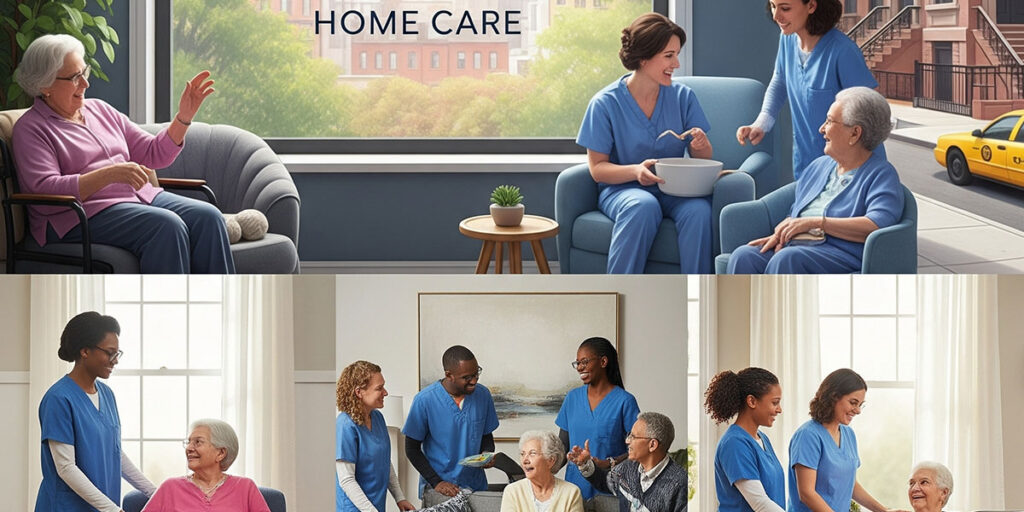Understanding Home Care Options in New York
For many older New Yorkers, the dream is to remain in their homes, surrounded by familiar comforts and cherished memories, for as long as possible. This desire, often referred to as “aging in place,” is a deeply held wish that reflects a fundamental aspect of human dignity. However, as health needs evolve, staying at home often requires assistance. This is where the complex world of home care comes into play. It offers a lifeline, providing crucial support that allows individuals to maintain their independence and quality of life.
In my three decades as a New York attorney specializing in elder law, I have seen countless families grapple with the daunting task of finding and funding appropriate home care. The landscape of available services, funding mechanisms, and eligibility requirements in New York is incredibly intricate. It often feels like navigating a maze, leaving families stressed and uncertain about how to get the best care for their loved ones without exhausting their life savings.
At Morgan Legal Group, we believe that understanding your options is the first step toward effective planning. This comprehensive guide aims to demystify the various types of home care available in New York, explain the legal and financial frameworks that govern them, and outline the critical strategies for affording these essential services. Whether you are seeking care for yourself or a family member, this information is vital. For personalized guidance on navigating this complex system, we encourage you to get in touch with our experienced team.
Part 1: The Spectrum of Home Care Services in New York
Home care is not a one-size-fits-all solution. It encompasses a broad spectrum of services, ranging from light companionship to highly specialized medical care. Understanding the distinctions between these types of care is crucial for matching services to specific needs and for navigating the funding mechanisms in New York.
1. Personal Care Services (Custodial Care)
Personal care, often referred to as custodial care, is the most common type of home care. These services focus on assisting with Activities of Daily Living (ADLs) and Instrumental Activities of Daily Living (IADLs). They are non-medical in nature but are vital for maintaining independence and personal well-being.
Activities of Daily Living (ADLs):
- Bathing: Assistance with showering, bathing, and personal hygiene.
- Dressing: Help with putting on and taking off clothes.
- Grooming: Assistance with hair care, oral hygiene, and shaving.
- Toileting: Support with using the toilet, incontinence care, and changing adult briefs.
- Eating: Help with feeding, including meal preparation and supervision.
- Transferring: Assistance with moving from a bed to a chair, or into and out of the shower.
Instrumental Activities of Daily Living (IADLs):
- Meal Preparation: Planning, cooking, and serving nutritious meals.
- Light Housekeeping: Maintaining a clean and safe living environment, including laundry.
- Medication Reminders: Ensuring medications are taken on time (not administering them).
- Shopping & Errands: Assistance with grocery shopping and other necessary errands.
- Transportation: Driving to appointments or social engagements.
- Companionship: Engaging in conversation, activities, and providing emotional support.
Personal care is typically provided by Home Health Aides (HHAs) or Personal Care Aides (PCAs) who are certified in New York State. These services can range from a few hours a day to 24/7 live-in care, depending on the individual’s needs. This type of care is crucial for quality of life.
2. Skilled Nursing Care (Home Health Care)
Skilled nursing care, or home health care, involves medical services provided by licensed healthcare professionals. These services are ordered by a doctor and are designed to treat an illness or injury, or to help a person recover from surgery or a medical event. It is distinctly different from personal care because it requires medical expertise.
Examples of Skilled Nursing Services:
- Medication Management: Administering injections, setting up pill boxes, and monitoring medication effects.
- Wound Care: Cleaning and dressing wounds, managing ostomies.
- Catheter Care: Insertion, maintenance, and removal of catheters.
- Post-Surgical Care: Monitoring vital signs, pain management, and rehabilitation assistance.
- Disease Management: Educating patients and families about chronic conditions like diabetes or heart failure.
- Physical, Occupational, and Speech Therapy: Provided by licensed therapists to help regain function and independence.
Skilled nursing care is typically provided by Registered Nurses (RNs) or Licensed Practical Nurses (LPNs). These services are often short-term, focusing on recovery, but can be long-term for chronic conditions requiring ongoing medical oversight. This is where medical expertise truly makes a difference.
3. Respite Care
Respite care provides temporary relief for family caregivers. Caring for a loved one is a demanding and often exhausting role. Respite care allows the primary caregiver to take a break, attend to personal needs, or simply rest, knowing their loved one is in capable hands. It can be provided in the home, in an adult day care center, or even at a short-term stay in a nursing facility.
4. Hospice Care (Palliative Care)
Hospice care focuses on providing comfort and support for individuals with a terminal illness, typically with a prognosis of six months or less to live. It shifts the focus from curative treatment to pain management and symptom control, aiming to improve the quality of life during the final stages. Hospice care can be provided in the home, allowing individuals to spend their last days in a familiar and comforting environment. It also offers emotional and spiritual support to both the patient and their family. Palliative care, while similar in its focus on comfort, can be provided at any stage of a serious illness, even while pursuing curative treatments.
Part 2: Navigating Home Care Funding in New York
One of the biggest concerns for New York families is the cost of home care. It can be incredibly expensive, potentially depleting a lifetime of savings. Understanding the various funding sources and eligibility requirements is crucial for effective NYC elder law planning.
1. Medicaid: The Primary Payer for Long-Term Home Care
In New York, Medicaid is the single largest payer for long-term home care services. It provides comprehensive coverage for both personal care and skilled nursing services for eligible individuals. However, qualifying for Medicaid involves strict financial and medical criteria.
Medicaid Eligibility Requirements (Simplified):
- Age/Disability: Generally, you must be 65 or older, or certified as disabled.
- Income Limits: Your monthly income must be below a certain threshold. New York has an “income cap” for long-term care Medicaid (often called Institutional Medicaid). However, a Spousal Impoverishment Rule protects the income of a healthy spouse.
- Asset Limits: You must have limited countable assets (e.g., typically around $30,182 for an individual in 2024). Many assets are “exempt,” such as your primary residence, one car, and personal belongings.
- Medical Need: You must have a medically documented need for home care services, meaning you require assistance with ADLs.
The “Look-Back Period” for Medicaid Home Care
Crucially, as of October 1, 2024, New York will implement a 30-month “look-back period” for home care Medicaid. This means that if you transfer assets out of your name within 30 months before applying for home care Medicaid, you may be penalized with a period of ineligibility. This is a significant change that makes proactive estate planning and asset protection more vital than ever. Our elder law attorneys specialize in navigating these complex Medicaid rules to protect our clients’ assets.
Managed Long-Term Care (MLTC) Plans
Most long-term home care services in New York are delivered through Managed Long-Term Care (MLTC) plans. These are health plans designed specifically for individuals who need long-term care services for more than 120 days. Once eligible for Medicaid, you enroll in an MLTC plan, which then coordinates and provides your home care services. The MLTC plan assesses your needs and authorizes the number of hours of care you will receive.
2. Medicare: Limited Coverage for Skilled Care
Medicare, the federal health insurance program for those 65 and older or with certain disabilities, provides very limited coverage for home care. It primarily covers **short-term, skilled, medically necessary** services. It does NOT cover long-term personal care or custodial care.
Medicare Home Health Coverage Requirements:
- You must be homebound (meaning it’s difficult to leave home without assistance).
- You need skilled nursing care or therapy services on an intermittent basis.
- A doctor must certify your need for these services.
- The care must be provided by a Medicare-certified home health agency.
Medicare coverage is designed for recovery, not ongoing long-term support. It will not cover services like meal preparation, bathing assistance, or companionship if that is the only care you need.
3. Long-Term Care Insurance
Long-term care insurance is a private insurance policy designed to cover the costs of long-term care, including home care, assisted living, and nursing home care. If you have such a policy, review its terms carefully. Policies vary widely in what they cover, daily benefit amounts, elimination periods (the time before benefits begin), and benefit durations. While a valuable asset, these policies are expensive and are typically purchased well in advance of needing care. They can offer significant peace of mind for those who can afford them.
4. Private Pay (Out-of-Pocket)
Many individuals and families initially pay for home care services out-of-pocket, especially if they do not qualify for Medicaid or have not purchased long-term care insurance. This can quickly become very expensive. In New York City, home care costs can range from $25-$35 per hour, and 24/7 care can easily exceed $200,000 per year. This often makes private pay unsustainable in the long run.
5. Veterans Benefits (Aid and Attendance)
Eligible wartime veterans and their surviving spouses may qualify for the VA Aid and Attendance benefit. This pension can provide significant financial assistance to help pay for in-home care, assisted living, or nursing home care. It has its own set of income, asset, and medical requirements. Our firm has experience assisting veterans and their families in navigating these benefits. This is a valuable, but often overlooked, resource.
Part 3: Planning for Home Care: Legal Strategies in New York
Given the high costs and complex eligibility rules, strategic legal planning is essential for accessing and affording home care in New York. This is where the expertise of an elder law attorney becomes invaluable.
1. Medicaid Planning: Protecting Your Assets
Proactive Medicaid planning is the most effective way to protect your assets while ensuring you can access quality home care. Our firm often utilizes irrevocable trusts, specifically a Medicaid Asset Protection Trust (MAPT). By transferring assets into a MAPT, those assets are no longer considered “countable” for Medicaid eligibility purposes after the 30-month look-back period for home care. This allows you to qualify for Medicaid without having to spend down your life savings on care. This strategy must be implemented well in advance of needing care.
2. Durable Power of Attorney and Health Care Proxy
While not directly funding care, these estate planning documents are critical for managing care. A Durable Power of Attorney allows your chosen agent to manage your finances, including paying for home care or applying for Medicaid on your behalf. A Health Care Proxy allows your agent to make medical decisions, including authorizing home care services or coordinating with your care team. Without these documents, a court-ordered guardianship may be necessary, which is time-consuming, expensive, and public.
3. Pooled Income Trusts
What if your income exceeds Medicaid’s limit for long-term care? In New York, a Pooled Income Trust can be a lifesaver. This type of trust allows individuals to deposit their “excess” income into the trust, which is then managed by a non-profit organization. The funds can be used to pay for allowable expenses not covered by Medicaid (like rent, utilities, food, etc.). This allows you to qualify for Medicaid while still using your income to maintain your quality of life. This is a critical tool for many middle-income New Yorkers seeking home care.
4. Understanding the Spousal Impoverishment Rules
When one spouse needs long-term care and applies for Medicaid, New York’s spousal impoverishment rules protect the healthy “community spouse” from becoming impoverished. These rules allow the community spouse to retain a certain amount of income and assets (the Community Spouse Resource Allowance and Minimum Monthly Maintenance Needs Allowance) while the other spouse qualifies for Medicaid. This is a complex area, and understanding these protections is vital for married couples. Our team is adept at navigating these rules to protect both spouses.
Conclusion: Empowering Your Choice to Age in Place
The desire to age in place is a powerful one, and in New York, a robust system of home care services exists to make this a reality. However, the financial and legal complexities of accessing and affording these services can be overwhelming. From understanding the differences between personal care and skilled nursing to navigating Medicaid eligibility, long-term care insurance, and the new look-back period, informed decision-making is paramount.
At Morgan Legal Group, we empower New Yorkers and their families to make those decisions with clarity and confidence. We develop tailored strategies that protect your assets, secure your access to quality care, and preserve your dignity and independence. Don’t wait for a crisis to begin planning. The time to plan is now, while you still have options and control.
We invite you to take the proactive step toward securing your future. Schedule a consultation with our experienced elder law attorneys today. Let us help you craft a plan that ensures you or your loved one receives the best possible care, right at home, where you belong.
For additional resources on home care services in New York, you can explore the New York State Department of Health website: NYSDOH Home Care Information.







